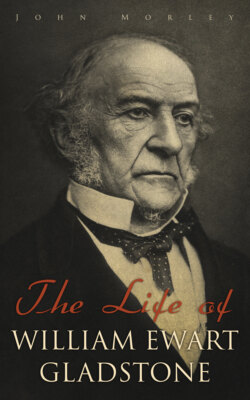Читать книгу The Life of William Ewart Gladstone - John Morley - Страница 24
На сайте Литреса книга снята с продажи.
CHAPTER I
ENTERS PARLIAMENT
Оглавление(1832-1834)
I may speak of the House of Commons as a school of discipline for those who enter it. In my opinion it is a school of extraordinary power and efficacy. It is a great and noble school for the creation of all the qualities of force, suppleness, and versatility of intellect. And it is also a great moral school. It is a school of temper. It is also a school of patience. It is a school of honour, and it is a school of justice.—Gladstone (1878).
FOREIGN TRAVEL
Leaving home in the latter part of January (1832), with a Wordsworth for a pocket companion, Mr. Gladstone made his way to Oxford, where he laboured through his packing, settled accounts, 'heard a very able sermon indeed from Newman at St. Mary's,' took his bachelor's degree (Jan. 26), and after a day or two with relatives and friends in London, left England along with his brother John at the beginning of February. He did not return until the end of July. He visited Brussels, Paris, Florence, Naples, Rome, Venice, and Milan. Of this long journey he kept a full record, and it contains one entry of no small moment in his mental history. A conception now began to possess him, that according to one religious school kindled a saving illumination, and according to another threw something of a shade upon his future path. In either view it marked a change of spiritual course, a transformation not of religion as the centre of his being, for that it always was, but of the frame and mould within which religion was to expand.
In entering St. Peter's at Rome (March 31, 1832) he experienced his 'first conception of unity in the Church,' and first longed for its visible attainment. Here he felt 'the pain and shame of the schism which separates us from Rome—whose guilt surely rests not upon the venerable fathers of the English Reformed Church but upon Rome itself, yet whose melancholy effects the mind is doomed to feel when you enter this magnificent temple and behold in its walls the images of Christian saints and the words of everlasting truth; yet such is the mass of intervening encumbrances that you scarcely own, and can yet more scantily realise, any bond of sympathy or union.' This was no fleeting impression of a traveller. It had been preceded by a disenchantment, for he had made his way from Turin to Pinerol, and seen one of the Vaudois valleys. He had framed a lofty conception of the people as ideal Christians, and he underwent a chill of disappointment on finding them apparently much like other men. Even the pastor, though a quiet, inoffensive man, gave no sign of energy or of what would have been called in England vital religion. With this chill at his heart he came upon the atmosphere of gorgeous Rome. It was, however, in the words of Clough's fine line from Easter Day, 'through the great sinful streets of Naples as he passed,' that a great mutation overtook him.
One Sunday (May 13) something, I know not what, set me on examining the occasional offices of the church in the prayer book. They made a strong impression upon me on that very day, and the impression has never been effaced. I had previously taken a great deal of teaching direct from the Bible, as best I could, but now the figure of the Church arose before me as a teacher too, and I gradually found in how incomplete and fragmentary a manner I had drawn divine truth from the sacred volume, as indeed I had also missed in the thirty-nine articles some things which ought to have taught me better. Such, for I believe that I have given the fact as it occurred, in its silence and its solitude, was my first introduction to the august conception of the Church of Christ. It presented to me Christianity under an aspect in which I had not yet known it: its ministry of symbols, its channels of grace, its unending line of teachers joining from the Head: a sublime construction, based throughout upon historic fact, uplifting the idea of the community in which we live, and of the access which it enjoys through the new and living way to the presence of the Most High. From this time I began to feel my way by decrees into or towards a true notion of the Church. It became a definite and organised idea when, at the suggestion of James Hope, I read the just published and remarkable work of Palmer. But the charm of freshness lay upon that first disclosure of 1832.
This mighty question:—what is the nature of a church and what the duties, titles, and symbols of faithful membership, which in divers forms had shaken the world for so many ages and now first dawned upon his ardent mind, was the germ of a deep and lasting pre-occupation of which we shall speedily and without cessation find abundant traces.
